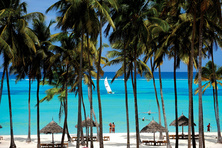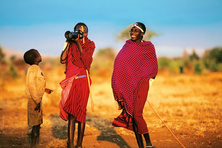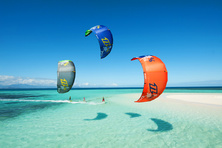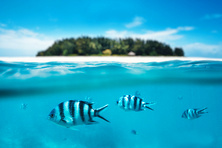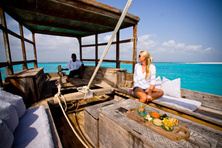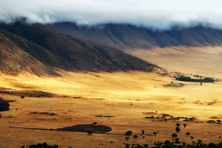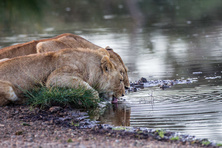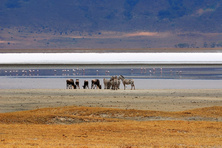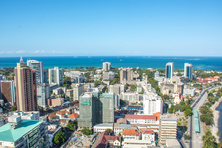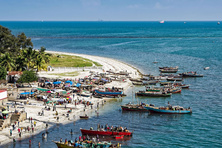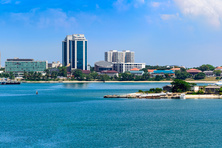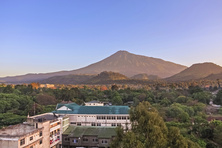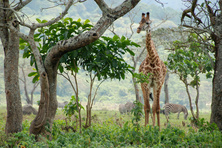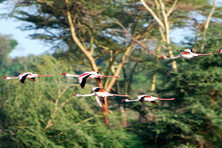Tanzania
- Currency: Tanzanian shilling
- Time: UTC+3
- Languages: Swahili, English
- Religions: Christianity, Islam
- Sections: Get in Visa Customs Cuisine Money Details of interest Popular resorts
The United Republic of Tanzania is a state in South East Africa. On the west, it borders Rwanda, Burundi, and the democratic Republic of the Congo. On the south, it shares its border with Zambia, Malawi, and Mozambique, and on the north, Tanzania borders Uganda and Kenya. The country is washed by the Indian Ocean, the waters of the Victoria Lake, Nyasa Lake, and Tanganyika Lake. The capital city is Dodoma.
The climate in Tanzania is sub-equatorial. The average temperature in winter is +22°C, in summer, the temperature can reach +25°C. The tourists can come here any time of the year.
The majority of the Tanzanians are the Christians and Muslims. The official languages are English and Swahili.
Climbers and skiers choose Tanzania because of the Kilimanjaro, the highest peak in Africa and the only peak with the ice cap on the continent.
For beach holidays, go to Dar es Salaam, the Zanzibar islands, Pemba, and Mafia Islands. Divers usually gather in Tanzania Marine Parks and on the islands of the Indian Ocean surrounded by the coral reefs, Morogoro, the Turtle Cave, and the Level Bank. The islands Zanzibar, Pemba, and Mafia are ideal for underwater fishing and snorkelling.
Out-of-town resorts offer the northern safari in the Serengeti National Park, Tarangire National park, the Lake Manyara National Park, and the Ngorongoro Conservation Area Authority. The southern safari is arranged in the Selous Game Reserve and in the Ruaha National Park. In the Selous Game Reserve, the tourists can hunt the lions and leopards. There are also hiking and trekking routes. The extreme tourists can go trekking in the Mount Meru in Arusha National park.
Those who loves city resorts more should go to Dar es Salaam and the Zanzibar island.
Get in
There are no direct flights between Tanzania and Russia.
By Plane
The tourists from Russian can choose Swiss International Air Lines flights with a transfer in Zürich or EgyptAir flights with a transfer in Cairo. KLM offers the flights with a stop in Amsterdam. Qatar and Emirates have direct flights to Dar es Salaam.
KLM offers the flights from Kiev and Almaty to Dar es Salaam. The tourists from Minsk can take a Swiss Airlines flight.
By Train
A TAZARA train is running between Kapiri Mposhi (Zambia) and Dar es Salaam. The travel time is about 40 hours.
By Ferry
There is a regular ferry route with Zambia, Burundi, Zaire, and Uganda across the lake Victoria and Tanganyika.
By Bus
International buses run between Mombasa and Lusaka and Dar es Salaam.
By Car
The tourists can travel to Tanzania by car from the neighbouring countries.
Visa
The citizens of the Russian Federation and CIS countries can get a visa on arrival. If you need a multiple-entry visa, then you should apply to the Embassy of Tanzania (a visa is valid for 90 days).
At the border, the tourists must provide the following documents:
- a valid international passport;
- immigration card and filled health report;
- return tickets and confirmation of financial sufficiency.
To travel to Tanzania it is necessary to get a vaccination against yellow fever.
Customs
The import of foreign currency is not restricted but any sum of money must be declared. The export of foreign currency is limited to the sum indicated on the declaration form. It is not allowed to export the national currency.
The tourists can bring in the following goods duty-free:
- tobacco;
- alcohol;
- 250 ml of perfume;
Video and photo gadgets must be declared.
The tourists can bring in small arms provided they have a permission from the Ministry of Internal Affairs of Tanzania.
If you take the pets they must be vaccinated against rabies.
It is prohibited to export:
- skins of wild animals;
- horn of rhinoceros;
- ivory goods;
- diamonds and cloves without special documents.
The Customs legislation of Tanzania allows exporting:
- coins and stamps;
- silver and gold jewellery (sales receipt is required);
- food for personal use.
Cuisine
The cuisine of Tanzania is traditional West African cuisine. Meat and seafood are staple food here.
The Tanzanians prefer poultry or the meat of wild animals. Pork and beef are almost never offered in restaurants. These meats are a delicacy in Tanzania.
Discover new dishes such as stew with elephant meat, antelope fillet, roasted warthog, and crocodile meat with delicate banana salad. Try a roasted chicken Njama Kuka, beef Njama Nkombe, meat Njama Choma, and meat and banana stew Njama na Ndizi. You will love the taste of a duck stew in coconut milk with rice and ostrich casserole with a fruit sauce.
As for the first course, try coconut-based beans soup. The locals love a thick African porridge Ugali. If you have guts for more exotic dishes, try roasted locust and termites.
Sweet root plants, beans, rice, and corn are usually served as side dishes. A popular appetiser here is made from stewed or roasted bananas with peanuts and meat. The sauces are very popular in Tanzania.
You will not be disappointed by lobster and crawfish, prawns with lime, an octopus soup, and fish roasted in banana leaves.
If you cannot imagine your holidays without sweets, you can try banana and mango custard, fruit mousses, candies Maandazi and Samosa with honey.
In Tanzania, quite a lot of alcoholic drinks are produced. The best beer brands are Kilimanjaro, Kibo-Gold, and Safari. The liqueurs Amarula and Africoco, gin Konyagi and Tanzanian wine Dodoma have gained popularity throughout the world.
Money
The official currency of Tanzania is the Tanzanian Shilling (TZS).
The tourists can exchange the currency at banks, in exchange offices Forex Bureaus or Bureaux de change. Keep the currency exchange bills until the end of your journey.
Credit cards are accepted only in large supermarkets, banks, and some travel agencies. You will not be able to pay with a credit card outside big cities. The banks charge 8% commission for transactions with credit cards.
To cash traveller’s checks, it is better to go to the licensed dealers, exchange offices, and banks. We recommend buying the checks in sterling pounds or US dollars. To cash traveller’s checks a passport is required. Such operations usually take a lot of time because each check is very thoroughly checked.
The tax-free system is not available in Tanzania. The VAT is 20% and this sum is already included in the price.
In the areas bordering Burundi and Rwanda, there is a great risk of the armed bands’ attacks.
Details of interest
So you have found your fellow travel and arranged all the visa issues. What sights in Tanzania are the most interesting? What gift can you buy for your friends in Tanzania?
Triplook is here to give you recommendations. We want you to have only positive impressions from your journey!
Customs and Traditions in Tanzania
The Tanzanians are very sociable and friendly with the tourists. However, do not forget about the general safety rules:
- Do not leave your personal belongings unattended.
- Do not show off how much money you have, do not carry expensive video and photo gadgets, documents, and jewellery.
- Always carry a copy of your passport and other documents and keep original documents in a safe in the hotel.
Sightseeing in Tanzania
- Dodoma. In your journey to Tanzania you should visit the Complex of Governmental Buildings, the National Assembly, the Geological Museum in Dodoma, and the Sikh Temple Dodoma. To the south of Dodoma, there is the Amani Nature Reserve. The Rock Art in Kondoa is inscribed on the UNESCO World Heritage List.
- Dar es Salaam. In the Asian quarter, there is a street named after Indira Gandhi. Visit the metropolitan Cathedral of St. Joseph and St. Paul’s of the Cross, the Clock Tower, the Palace of the Sultan Majid, and religious buildings on the Mosque Street. We also recommend visiting the National Museum of Tanzania and the Art gallery Nyumba-I-San.
- On the Zanzibar Island, the tourists can take an excursion to the ancient district in the Stone Town of Zanzibar which is under UNESCO protection. Thos who love the monuments of architecture will be delighted to see the ruins of Maru Hubi and Mtoni Palace.
- The Kilimanjaro (a UNESCO site) is rightly called the Crown of Tanzania. The trekking routes of any complexity will not leave indifferent the lovers of climbing and hiking.
- The main places for ecological tourism are the Ruaha National Park, the Serengeti National Park, the Arusha Reserve, and the Lake Manyara National Park.
- In the Selous Game Reserve, the tourists can go safari and hunting. This place is under UNESCO protection.
- The Lake Tanganyika is one of the African Great Lakes and it was formed in the result of a tectonic shift. It is the second deepest lake in the world after Baikal.
- In Tarangire, rare species of acacia, gigantic baobabs, and date palms grow.
- Due to its unique landscape, the Ngorongoro Reserve (a UNESCO site) is known as the eighth wonder of the world. Near the southern border of the crater, there is a hotel Ngorongoro Crater Lodge surrounded by untouched nature.
Souvenirs in Tanzania
- Makonde tree goods (tableware, figurines, masks) can be found in Makonde.
- Tingatinga paintings are sold in Dar es Salaam.
- Maasai shuka (or African blanket) and amazing batik are sold in the capital city.
- Violet, light blue, and blue tanzanites, green tourmalines, emeralds, and rubies are sold in Dodoma.
- Look for the best malachite, leather, wooden, and beads goods, a soap stone, and baobab oil on the Zanzibar Island.







